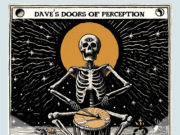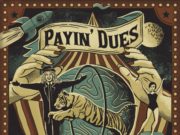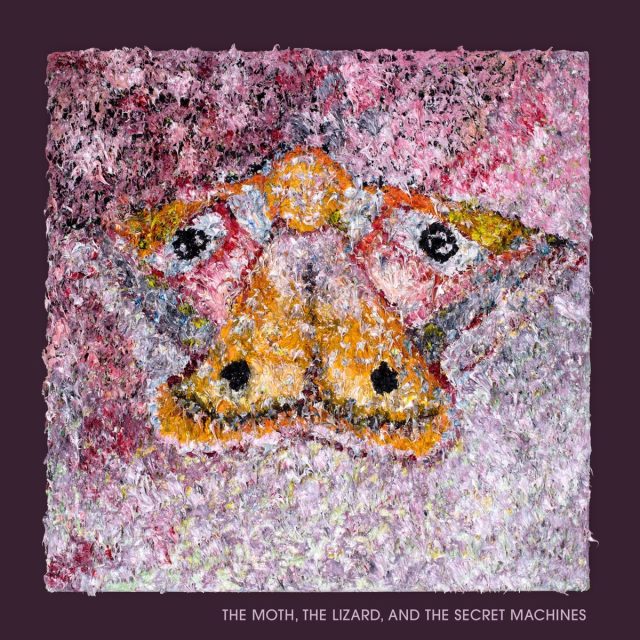THE EDITED PRESS RELEASE: “Much like a frantic movie about unfinished business or the one that got away, The Secret Machines spent the past few years finally putting the finishing touches on what should have been their fourth LP. Long regarded as a lost album, The Moth, The Lizard, And The Secret Machines was actually put on pause in 2010 and massaged in the aftermath of 2020’s return-to-form record Awake in The Brain Chamber.
This essentially makes it the missing link between that effort’s brash pop songs and 2008’s sorely overlooked self-titled LP. (The latter receives a long overdue digital reissue this fall — one that features a far more fitting tracklisting and robust final master from Slowdive drummer and like-minded solo musician Simon Scott.) “If you listen to them in order,” says singer and multi-instrumentalist Brandon Curtis, “Awake In The Brain Chamber is basically a reaction to the Moth… record — very tight and verse / chorus / verse / chorus rather than loose, sprawling and unconventional.”
That contrast makes perfect sense when you consider how The Moth… was made. Rather than write and painstakingly rehearse its widescreen material, Secret Machines workshopped the record in real time the way a manic novel might be written. It started as a simple experiment; having recently hit a rough patch due to the loss of their label (World’s Fair shuttered right after Secret Machines was released) and other maddening business matters, the bi-coastal band’s core duo (Curtis and cleanup hitter Josh Garza) were eager to regroup in the secluded home studio of guitarist Phil Karnats.
A fellow alum of Dallas’s incestuous music scene, Karnats had joined Secret Machines for their self-titled sessions and quickly found his own fiery voice within the gap left by Benjamin Curtis. (Brandon’s brother announced his amicable split from the formidable trio he co-founded in 2007 — a decision spurred on by his new project School Of Seven Bells — and passed away from a rare form of lymphoma six years later.)
Between their burgeoning knowledge of production software and lack of pressure from a label or their longtime management team — both were out of the picture by 2009 — Curtis and Karnats felt driven to record some rough material themselves. “If it didn’t work,” remembers Curtis, “It didn’t work. We had nothing to lose. But it did work, partly because the environment was so relaxed. I wouldn’t say the sounds were there right out of the gate, but as time progressed, we were able to pull something together that made perfect sense for where our heads were at the time.”

One key reference point of the Moth… sessions was something Garza and Curtis bonded over back in their early days: The Buddhist philosophy of “first thought, best thought.” A guiding principle of everyone from Beat poet Allen Ginsberg to downtown icon Arthur Russell, it’s the idea that you’re better off cutting riffs, beats and chords straight to tape than arranging or composing anything concrete beforehand. In other words, it’s music made of fleeting moments and memories rather than rearranged verses and melodies — about as pure as a creative endeavor can be.
“We were actually in a pretty dark place at the time,” explains Garza, “and felt that the only way to not get lost in that darkness was to play a couple chords, breathe, and get lost in this weird head trip. After a few days, Brandon would listen back to what we did and be like, ‘Hey, this part is kind of cool.’ Then we’d start recording over that. The drums and vocals were often the last thing we added, because we didn’t even know there would be songs. I thought they were instrumental exercises for a while there — just us trying to generate happiness out of music.”
For Curtis, this was both the best and worst thing about making the Moth… record. While part of him enjoyed relinquishing the pressure to pore over specific parts, the album’s loose sessions sometimes felt like being pushed out of a plane with a parachute while a stranger screams, ‘Don’t worry; you’re gonna be fine!’ “It was a little bit challenging for me when we were doing stuff in the moment,” he admits. “I felt like a fish out of water because my role would normally be to sit and agonize over something for weeks and then present it.”
That’s one major reason why it took more than a decade for The Moth, The Lizard, And The Secret Machines to go from being a much-needed therapy session to a proper album — it took years for Curtis to truly let go and embrace, rather than run from, imperfection. Or as he puts it, “I’ve finally figured out how to deal with things exactly how they are. Unfiltered guitars and raw drums don’t have to be fixed if they already sound perfect. I fell in love with this record when I stopped trying to make it something it wasn’t — when I left enough space for creativity to bloom rather than holding on for dear life and squeezing so hard my knuckles would turn white.”
Don’t worry; Secret Machines didn’t just wrap their most self-indulgent record. Their long-awaited fourth LP is full of winding earworms and hummable hooks, from its fearless, thunderstruck opener There’s No Starting Over and the Fripp & Eno-esque outro of Crucifixion Time to the broken-hearted balladry of Run Out the Silver Light and the somber instrumental sequence that is Last One Out. “This album is really special to us because it represents a band playing music with no other agenda than to connect with one other,” says Garza. “My main hope is that people will hear it and say, ‘These guys went somewhere weird, man.’ I feel like Secret Machines finally delivered the crazy album everybody knew we had in us.”
Concludes Curtis: “Finishing this album was really existential for me. What are we doing this for? What’s the point?’ And it took me until about two or three years ago to realize that the point is the work.”










































